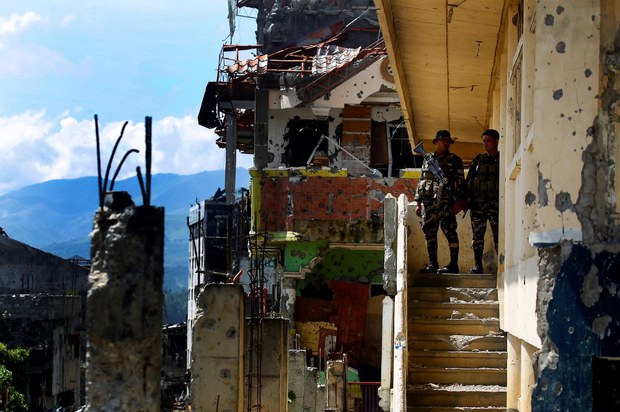Philippines: Duterte’s Plan to Extend Martial Law Gets Mixed Reactions
2017.12.12
Marawi, Philippines
 Soldiers take part in operations to secure and clear downtown Marawi of any enemies following a five-month battle with Islamic State-linked militants in the southern Philippine city, Nov. 23, 2017.
Soldiers take part in operations to secure and clear downtown Marawi of any enemies following a five-month battle with Islamic State-linked militants in the southern Philippine city, Nov. 23, 2017.
Troops went on heightened alert Tuesday in the southern Philippine city of Marawi to thwart reported plans by remaining members of Islamic State-linked groups to stage scattered attacks in the area, military officials said.
The alert came a day after President Rodrigo Duterte said he had asked Congress to extend martial law over the entire southern Philippines by one more year, through December 2018, to allow security forces to eradicate the militant threat in the region.
Soldiers with long firearms guarded checkpoints on roads around Marawi, a once-beautiful lakeside city destroyed during a five-month battle with pro-Islamic State (IS) militants that the government declared over in late October.
A volunteer for a humanitarian agency allowed to enter Marawi on Tuesday said the group had to pass through several security checkpoints along the roads, as troops scrutinized each passing vehicle. Some civilians were asked to show identity clearance cards, especially those claiming to be residents who were returning to check on their property.
For Mamintal Adiong Jr., the governor of Lanao del Sur province surrounding Marawi, an extension of military rule would be a welcome development by enabling civilians to return to their homes and reoccupy them under a security umbrella.
“There is a dire need to extend the martial law in Mindanao for one year,” Adiong said.
Military intelligence reports had indicated the movement of some people known to be allied with the group of slain IS leader Isnilon Hapilon and the Maute gang, the governor said.
They are “in the process of recruiting new members” in remote townships and, if left unchecked, could regroup and threaten other urban centers in the south, he said.
Giving the military free reign in the region could also allow the unhampered implementation of Marawi’s rehabilitation plan, Adiong added.
The military here recently confirmed that militant holdouts were plotting to stage similar attacks in the nearby towns of Piagapo, Sultan Dumalondong and Lumba Caunayan.
Tension was also high at Marawi’s Mindanao State University, where classes resumed despite talks of possible attacks from fresh IS recruits.
According to a Philippine intelligence source, militants could try to storm the university, which they had failed to infiltrate and occupy during the siege.
Lt. Col. Eliezer Valdez, commander of the 4th Mechanized Infantry Battalion, said the security alert was also raised in Iligan city, about 30 km (18.6 miles) north of Marawi, where many residents from the ruined city had sought shelter with relatives.
Psychological impact
In Manila, Sen. Franklin Drilon said asking Congress to extend martial law was done for its “psychological impact,” but was not a valid reason.
While Duterte cited a threat from IS militants for justifying an extension of martial law, he also pointed to a security threat posed by the communist New People’s Army (NPA), which he had recently blacklisted as a terrorist organization.
Drilon noted that the self-proclaimed leftist president had once enjoyed a cordial relationship with the rebels, and even released their jailed comrades so that they could join peace talks being held abroad.
The peace talks collapsed as rebels continued to stage attacks in remote communities, despite agreeing to a truce.
“That Duterte has for decades befriended, coddled and given aid and comfort to the NPA in the Davao region is no secret,” said Sen. Leila de Lima, referring to the southern city where Duterte was the longtime mayor before becoming president in June 2016.
“He has politically aligned himself not only with the movement but with its ideology as well, or at least the part of it that constantly served his authoritarian streak,” she added.
She suggested that Duterte may have dumped the communists to curry favor with the military, some of whose top officials had earlier expressed misgivings about the president’s alleged soft stance toward the rebels.
“Duterte using the red scare to ask for an extension of martial law is opportunism exemplified,” said de Lima, who has emerged as the number one critic of Duterte and alleged rights abuses committed under his war on drugs.
“Martial law powers cannot be given to the major enabler of the communist rebellion in Mindanao,” she said, adding that Duterte was engaged in “creeping authoritarianism.”
Felipe Villamor in Manila contributed to this report.







